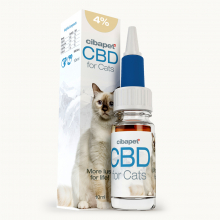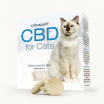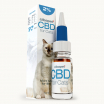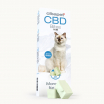Does CBD Make Cats Sleepy?
Published:
Cannabidiol (CBD) has become increasingly popular as a supplement for both humans and pets in recent years. But does giving CBD to cats really make them sleepy? Let's take a look at what science says.
Contents:
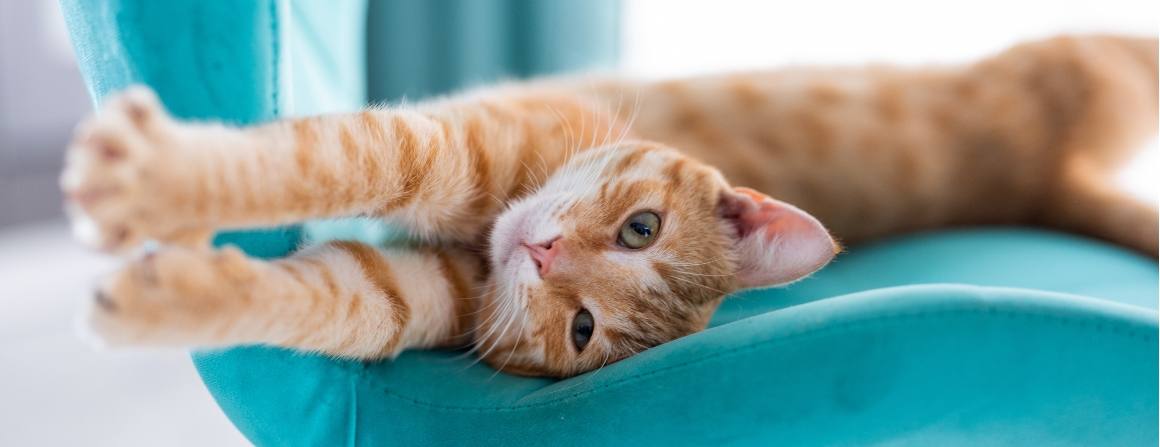
What is CBD?
CBD is one of over 100 chemical compounds called cannabinoids found in the cannabis plant. Unlike the most well-known cannabinoid THC, CBD is non-intoxicating. This means it does not produce a “high” or psychoactive effects.
However, CBD does interact with the endocannabinoid system (ECS) - a complex cell-signaling system in mammals that helps regulate basic functions like sleep, appetite, pain, mood and more. By interacting with receptors in the ECS, CBD can potentially influence these functions in the body.
This is why CBD is now commonly used by humans as a natural supplement to help support overall health and wellbeing. Pet owners are also increasingly giving CBD products to their dogs and cats for the same purpose. But it's important to understand how CBD actually affects cats before giving it to your feline friend.
Can Cats Take CBD?
The short answer is yes, cats can take CBD. But there are some important things to consider.
Cats have an endocannabinoid system just like humans and other mammals. So they have the same endocannabinoid receptors in their body that can interact with CBD.
Several studies show that CBD is generally well-tolerated by cats and dogs. It does not seem to cause significant side effects at appropriate doses.
However, there is still limited research on the effects of CBD specifically in cats. More studies need to be done on proper dosing to ensure safety.
It’s also crucial to only use high-quality CBD products designed for pets. Avoid any CBD oil made with additives like flavorings, carrier oils or preservatives, which may be harmful to cats.
So consult with your veterinarian before giving any CBD product to your cat. But overall, current evidence suggests CBD is reasonably safe for cats when used properly.
Does CBD Make Cats Tired?
Now let’s dive into the main question - can CBD make cats sleepy or lethargic?
There isn’t much research specifically on CBD’s effects on sleep in cats. But we can look at some initial studies in dogs and anecdotal reports from pet owners to get an idea.
Some pet owners do report that CBD seems to make their cats more relaxed and sleepier. But laboratory research looking at CBD’s effects on sleep in other animals shows mixed results.
A 2018 study examined CBD’s effects on sleep in rats. The researchers found that low doses of CBD mildly increased total sleep time. However, higher CBD doses decreased sleep duration.
A more recent 2019 study looked at CBD’s effects on dogs with osteoarthritis. The dogs were given 2 mg or 8 mg of CBD oil per kilogram of body weight twice daily. The researchers found no significant differences in sleep behavior between dogs given CBD and those given a placebo.
So while CBD may potentially encourage relaxation, current evidence does not conclusively show it makes animals sleepy. Higher doses may even have stimulating effects in some cases.
Much more research is still needed on CBD’s effects on sleep-wake cycles in both humans and animals. But the research so far suggests any sleep-promoting effects are likely to be mild and highly dose-dependent.
Potential Reasons CBD Could Make Cats Sleepy
While CBD may not have direct sedative effects, there are some reasons it might make some cats appear sleepy or lethargic:
1. Relief from pain or discomfort
Cats can become more inactive if they are dealing with chronic or acute pain. By relieving pain, CBD could potentially help a cat rest more comfortably. Reduced activity from pain relief may be perceived as sleepiness.
2. Decreased anxiety or stress
Anxious cats often have restless, interrupted sleep. If CBD helps lower anxiety as some studies suggest, this calming effect could allow a cat to sleep more soundly.
3. No "high"
Unlike THC, CBD does not cause intoxication or impairment. But sometimes decreased activity or mental stimulation from CBD may be mistaken for sedation.
4. Changes in metabolism
CBD can temporarily alter how medications, supplements or toxins are processed in the liver. This could theoretically impact a cat’s energy level until their metabolism adjusts. But more research is needed in this area.
So in summary, perceived sedation from CBD may actually be a result of reduced pain, anxiety, inflammation or other benefits - rather than a direct sleep-promoting effect.
Potential Benefits of CBD for Cat Health
While more studies are still needed, current research suggests CBD may provide certain therapeutic benefits for cats. Some potential benefits being explored include:
Pain relief - CBD may activate receptors involved in regulating pain and inflammation. Early research shows CBD has significant pain-relieving effects in rodents. It may help relieve chronic inflammatory conditions or acute post-operative pain in cats.
Anti-seizure - CBD has anti-seizure effects in humans and laboratory animals. In a small study of dogs, 89% had a reduction in seizure frequency when given CBD oil. More research is needed, but CBD may potentially benefit cats with epilepsy or seizure disorders.
Appetite stimulation - CBD may increase food intake and appetite by interacting with CB1 receptors involved in hunger signals. This could help stimulate appetite in cats with cancer, liver disease or other conditions causing poor appetite.
Anti-anxiety - Studies show CBD has anti-anxiety effects in both humans and animals. While high doses may be sedating, low doses may relieve anxiety without drowsiness. CBD could potentially calm anxious cats, especially during stressful events like travel or vet visits.
Anti-inflammatory - By reducing inflammation, CBD may relieve joint stiffness and mobility issues in arthritic cats. It may also help with inflammatory bowel diseases.
Cardioprotective - CBD’s antioxidant and anti-inflammatory properties can support heart health. It may benefit cats with certain heart conditions. But more studies are needed.
Cancer-related symptoms - Research shows CBD and other cannabis compounds may slow cancer growth and induce cancer cell death in certain cancers. CBD could help alleviate side effects of cancer and chemotherapy in cats, but more research is required.
Again, these potential uses need more investigation. But current evidence suggests CBD may be beneficial for many feline health issues when used responsibly under veterinary guidance.
Is CBD Safe for Cats?
CBD is generally well-tolerated by cats, but there are some potential side effects to be aware of. Mild effects reported in some cats after taking CBD include:
- Temporary drop in blood pressure
- Drowsiness or lethargy
- Reduced appetite
- Gastrointestinal upset
These effects are usually mild and typically resolve on their own within a few hours. But proper dosing is important to minimize risks.
There are some situations where CBD should be avoided or used with extreme caution in cats:
Kidney disease - CBD is metabolized in the liver but eliminated through the kidneys. Impaired kidney function may cause CBD to accumulate to potentially toxic levels. CBD should be avoided in cats with severe kidney disease.
Blood-thinning medications - CBD can inhibit the metabolism of common anticoagulant medications like warfarin. This may increase bleeding risk. Extra precautions should be taken if combining CBD with blood thinners.
Immunosuppressants - CBD may potentially increase the potency of immunosuppressive drugs like cyclosporine. Combining the two could overly suppress the immune system. Additional monitoring may be needed.
Pregnancy/nursing - There is limited research on CBD safety for pregnant or nursing cats. It is likely best to avoid CBD during pregnancy and while nursing.
Also avoid giving CBD to cats under 6 months old, and consult your vet before combining CBD with any prescription medications. Start with low doses and monitor for any adverse reactions.
With responsible use, most healthy adult cats should be able to tolerate CBD well. But consult a veterinarian before administering CBD to your cat.
What's the Correct CBD Dosage for Cats?
There are no official dosing guidelines for CBD in cats yet. However, general expert recommendations suggest starting with 0.1 to 0.5 mg of CBD per kilogram of your cat's body weight twice daily.
For example, a 10 lb cat weighs around 4.5 kg. So a starting dose would be 0.45 to 2.25 mg of CBD twice a day.
Some key dosing considerations:
- Start low (0.1 mg/kg) and gradually increase if needed
- Split into 2 doses given ~12 hrs apart
- Give with food to increase absorption
- Monitor for side effects like diarrhea or drowsiness
- Buy pet-specific CBD products without additives
- Consult your vet, especially for cats on medication
Proper dosage can vary greatly between cats based on factors like age, health issues, medication use and more. Work closely with your vet to find the optimal dosage for your individual cat.
It can also take 2 - 4 weeks to see the full effects of CBD in pets. Be patient and stick to a regular dosing schedule before increasing the amount. Tracking your cat’s symptoms will help you determine ideal dosage and timing.
What to Look for in CBD Products for Cats
There are countless CBD products on the market now - but not all are created equal. Here are some tips for choosing high-quality CBD suitable and safe for cats:
- Made specifically for pets - Avoid any CBD made for humans. Pet CBD has lower, more appropriate doses and flavorings/carriers better suited for cats.
- Organic hemp sourced in the US - Domestically grown organic hemp is less likely to have contaminants like pesticides, solvents or heavy metals. European-grown hemp can also be high quality.
- Full spectrum extract - Full spectrum CBD retains other beneficial hemp compounds. But THC levels must be
- CO2 extraction method - CO2 extraction yields pure, highly bioavailable CBD oil. Avoid CBD extracted using heat or chemicals.
- 3rd party lab tested - Reputable brands test for purity, potency and safety at independent labs. Ask for recent Certificates of Analysis.
- Unflavored oils - Flavoring additives like mint, bacon, etc can be harmful. Choose a natural unflavored CBD oil.
- Organic carrier oil - Better carriers for cats include organic hemp seed oil or MCT coconut oil, not olive or other oils.
Choosing CBD products made specifically for pets from high-quality organic hemp can help maximize benefits while minimizing risks for your cat.
Frequently Asked Questions
To summarize the key points covered in this article, here are answers to some common questions about CBD for cats:
Is CBD safe for my cat?
CBD is generally well-tolerated but consult a vet before use, start with low doses and monitor for side effects. Avoid CBD for pregnant/nursing cats or cats with severe kidney disease.
Will CBD make my cat sleepy?
CBD is unlikely to directly sedate cats but may support sleep indirectly by relieving pain, anxiety, etc. Higher doses can have stimulating effects. Individual responses vary.
What conditions might improve with CBD?
More studies are needed, but CBD shows promise for helping with anxiety, seizures, arthritis, appetite issues, inflammation and chronic pain in cats.
What’s the right dosage of CBD for a cat?
There are no official dosing guidelines yet. Experts suggest starting with 0.1 - 0.5 mg of CBD per kg of body weight twice daily. Gradually increase from there as needed.
How long does it take for CBD to work in cats?
It can take 2 - 4 weeks of regular dosing to see the full effects of CBD in cats and dogs. Track symptoms and adjust dosage slowly. Improvement is usually gradual.
What should I look for when buying CBD for pets?
Choose organic, pet-specific CBD oils with documented purity/potency testing. Avoid additives like flavorings, dyes or preservatives.
Can I give my cat CBD oil made for humans?
No, human CBD is unsuitable for cats. Only use pet-specific CBD oils formulated especially for cats or dogs.
Always consult your veterinarian before giving your cat any new supplement like CBD. But current evidence suggests CBD can be a safe, natural way to support feline health and wellness when used responsibly.









